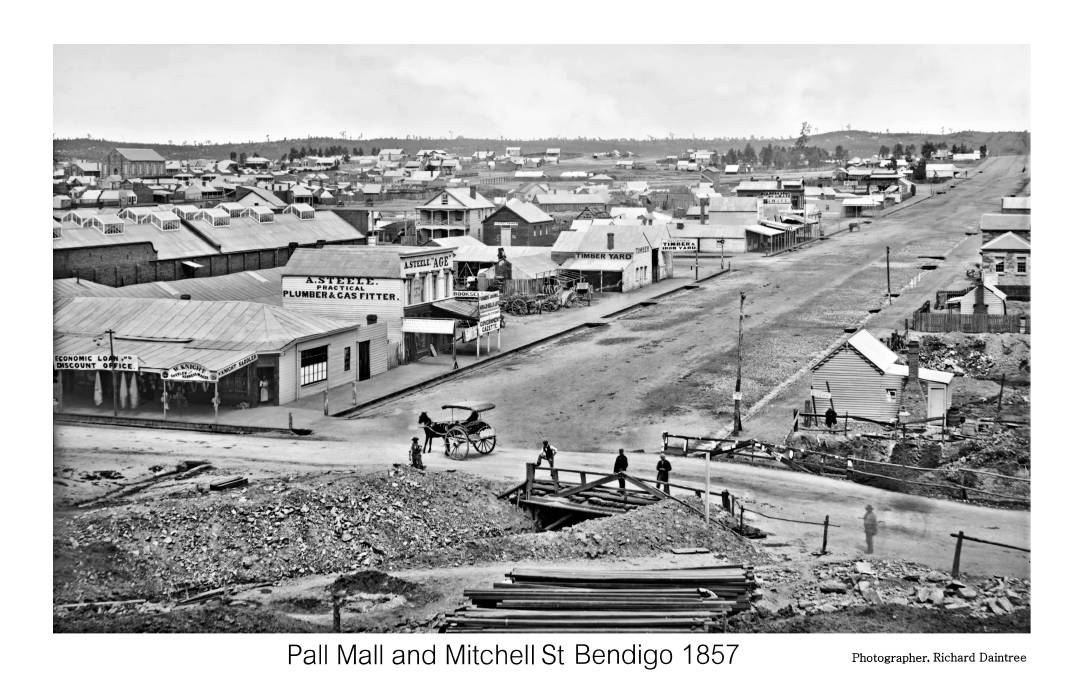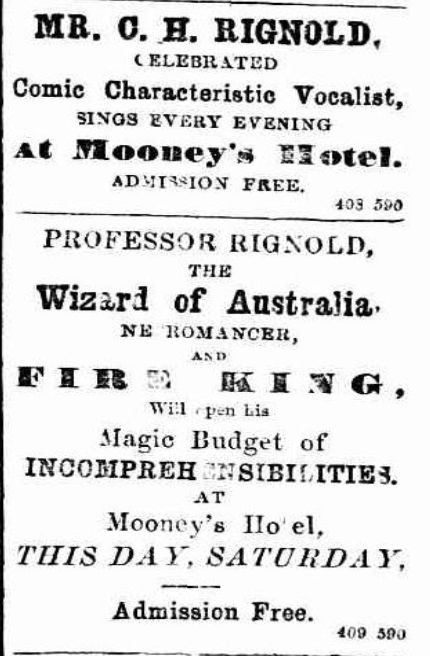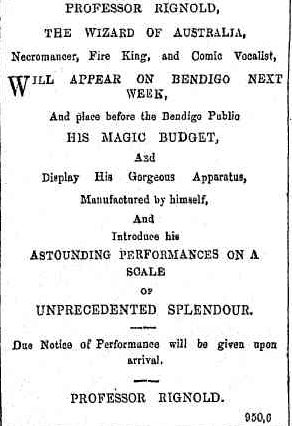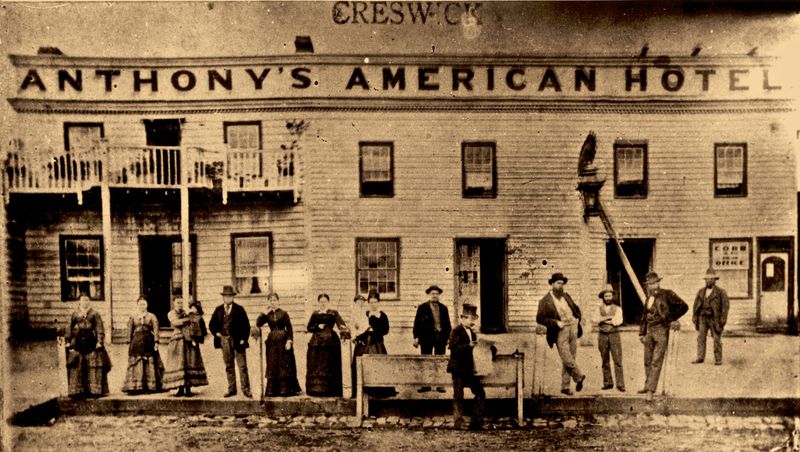The tragic death of Professor Charles Rignold,
Wizard of Australia
Wizard of Australia
The annals of conjuring contain numerous stories of performers who have met with injury or even death in the course of their career. Charles Rignold is another of those sad cases, though his death seems to have been largely overlooked until now.
Early Career of Rignold
Charles Henry Rignold was essentially a variety performer specialising in comic songs. He should not be confused with the far more famous Shakespearean actor, George Richard Rignold (1839-1912) who was also prominent in Australian theatre.
Declaring himself to be from the Pavilion Theatre, London, Mr Rignold, possibly born in 1825, was featured as a comic singer in Hobart’s Royal Victoria Theatre (Tasmania) in August 1853, both as a “celebrated Scottish Ballad singer” and also as the entrepreneur of a sizeable company at Launceston’s Royal Olympic in September, incorporating the full range of songs, dramas and farces.
By June 1854, Rignold is to be found as the proprietor of the newly-opened Royal Victoria Theatre in Sandhurst (later to become Bendigo), Victoria. Said the Freeman’s Journal (June 10), “At the new theatre, the Victoria, under the management of Mr. Rignold, the scenery and stage business of the pieces are excellent, but the acting is below par.”

The “Victoria”, on the site where now stands the Town Hall, was in competition with a theatre opened only three months earlier, the “Royal”, where the historic Shamrock Hotel continues to exist today. Later in 1854, the “Princess’ Theatre” was opened at the Criterion Hotel. There was commentary in the press suggesting that such a number of theatres in Bendigo could not survive, and it would appear that Rignold’s theatre was the first to collapse, as by February 19, 1856, two allotments were advertised for sale on the corner of Hargreaves-street and Bull-street, “on the site where Rignold’s Victoria theatre stood.”
Rignold himself remained in the area of Bendigo and had already formed ‘Rignold’s Celebrated Dramatic Company’, seen at the Theatre Royal, Castlemaine, starting on July 21, 1855, with a cast of thirteen ladies and gentlemen and a splendid brass band of nine.
Criminal History
Bendigo and the surrounding districts were in the bustling hub of the Gold Rush, and since the discovery of gold there in 1851, thousands had sailed into the country and struggled up via Melbourne to try their luck. The notorious Eureka Rebellion occurred in Ballarat in 1854, pitting goldminers against the colonial rule of Britain.

Amidst the booming fortunes, disastrous failures and unsettled social life of the ‘diggings’, it seems unsurprising that Rignold had a couple of encounters with the law, assuming that he was the same “Charles Henry Rignold” named in the press, which seems very likely. He and a Henry Williams were charged in August 1856 with the theft and receiving of a gold watch and chain, brooch and locket. Rignold was found guilty of petty larceny and sentenced to six months imprisonment with hard labour. Looking back as far as 1852, a Charles Rignold had similarly been sentenced to prison for other crimes of theft, but it cannot be said with certainty that this was the same person. It was a sign of the times that a man might re-invent himself; not only because of the ‘wild west’ environment of the gold diggings, but because having a convict history was nothing unusual in Australia’s early years as a British convict dumping ground.
Rignold the Wizard
This might well account for a hiatus in Rignold’s public profile, and when he next appears, from May 29 1858, at Mooney’s Hotel, Beechworth, it is in the new guise of both “comic Characteristic Vocalist” and “Professor Rignold, the Wizard.” According to the newspaper of the goldfields, the ‘Ovens and Murray Advertiser’, “the house is every night crowded and his tricks are well worth seeing.” He certainly must have been doing well, for the Mooney’s Hotel season continued until June 16. There was a small hitch when he was charged with petty larceny for attempting to remove his own property from the Telegraph Hotel, but in late June the magistrate dismissed the case, "and severely censured the conduct of the prosecutor in bringing the charge." (1)

1858 - May 29 and August 14 advertising

Shortly afterwards, on August 21 1858, “Professor Rignold, the Wizard of Australia, necromancer, Fire King and Comic Vocalist”, made his first appearance at Abbott’s Assembly Hall, Bendigo.
A brief flurry with the law again ensued in November, police charging Rignold with the theft of a dray and harness in Castlemaine, but the Crown Prosecutor declined to prosecute; and by November 22 Rignold was said to be headed south to Gisborne for a performance. He continued to journey south into early 1859, as far as Portland, on the far southern tip of mainland Australia, where, after showing at Mr. Hogan’s New Grand Assembly Room in the Tasmanian Hotel on January 14-17, the Portland General Advertiser said, “the various tricks in legerdemain were of a new, and superior kind, and the performances throughout elicited the greatest astonishment.” Just in case the press did not praise his show, Rignold advertised “…the greatest Wizard of the North, who will open his MAGIC BUDGET and display his Gorgeous Apparatus, manufactured by the most eminent Artistes, and introduce his Astonishing Performances, at the above place and date, on a scale of unprecedented splendour.”
By February 19, 1859, Professor Rignold had returned north to the Star Concert Hall in Ballarat, for a season which ran from February 21 until March 9. Admission was free but required purchase of a 1 shilling “Refreshment Ticket.” He featured a new by-line: “Wizard of the North, East, South and West.” (As a matter of pedantic interest, the contemporary performer, James Eagle, called himself the Wizard of the North, South, East and West ). Also playing in the township was Professor Ericksen, the Scandinavian Wizard.
Staying within the goldfields region, and a performance at Smythe’s Creek on April 7, Rignold was beginning to look further afield; the Star (Ballarat) reported on May 13 that “Professor Rignold, a clever and popular wizard and comic singer, in company with “the doctor’s puzzle”, the contortionist Devani, will leave Brown’s soon for Calcutta.”
It was not to be. In early July, the Bendigo Advertiser mis-reported that Professor Ericksen had been injured in a gun accident; but the next day the story was corrected. It was Professor Rignold who had been hurt, and from an inquest of July 8, 1859 we learn of the horrible cause of his death starting at a show on June 18:-
Death in Creswick
[Bendigo Advertiser, July 12, 1859] DEATH FROM BURSTING OF A GUN
“We learn from the Ballarat papers the death of C. H. Rignold, who was manager of the Victoria Theatre on Bendigo four or five years ago. We take the following account from the Star. It is evident that this accident gave rise to the report about Professor Erickson. An inquest was held on Friday, the 8th instant, touching the death of Charles Henry Rignold. The following evidence was given by Samuel Pope Davis, servant to Councillor Rowe, of Creswick [just north of Ballarat]:-
Deceased was a conjuror, and was called the Wizard of the North, South, East and West [incorrect, as noted above] and engaged witness to assist him. He played at Carson’s Hotel, Creswick, on the 11th, 13th and 16th June, and at the Red Streak on the 18th, and when in the coarse [sic.] of his performance he commenced the gun-trick, the piece would not go off. Deceased then put another charge of powder in the same gun, laid it aside, and then played one or two more tricks, and again took up the gun, and then put a third charge into it. He was then supposed to put a watch into it, and cocked the gun, put it to his shoulder, fired, and the barrel burst, parts of it striking him on the left side of his forehead, and he staggered, but continued his performance, and finished it.
Witness saw deceased next day (Sunday), also on Monday, when he again performed; but on the following Friday he was taken seriously ill. Dr. Roche was subsequently sent for, but was not at home, and on Friday last he was removed to the Ballarat Hospital. Dr. Hillas deposed to the state of the deceased when admitted; his memory and sight were impaired, and also his speech; three pieces of the frontal bone had penetrated the substance of the brain. Two days afterwards, inflammation set in, and deceased gradually sank, and died on the 5th [July 1859] instant. The doctor also gave an opinion that if deceased had received proper medical treatment at the time of the accident, his life would have been saved. Verdict, “Accidental Death.”
From the description given of the trick involved, it is clear that Rignold had not been performing the infamous “Catching a Bullet” routine. The likely effect, using a long-barrelled gun (held to the shoulder), would have been the apparent destruction of a spectator’s watch, the pieces of which were seemingly, but not really, “loaded” into the gun barrel and then fired at a target or a box, where the unharmed watch was later found.
The fatal end to Professor Rignold’s life and career was just another passing story in the sweep of Gold Rush history, yet we cannot help mourning the loss of a minor but popular magician of his day.

Not “Carson’s Hotel”, but the “American” in Creswick, Victoria, early 1850s.
REFERENCES
(1) Ovens and Murray Advertiser, June 21, 1858